1. The Star-Spangled Banner – Jimi Hendrix’s Woodstock Rendition
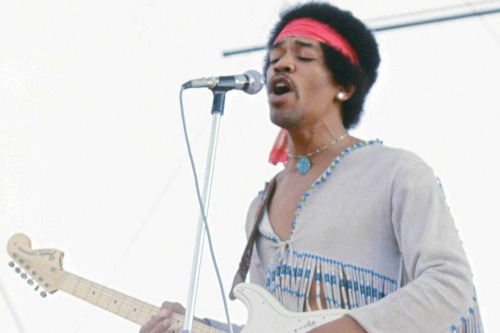
Jimi Hendrix’s electric guitar version of “The Star-Spangled Banner” at Woodstock in 1969 is now legendary, but it rattled more than a few people at the time. With wailing distortion mimicking bombs and screams, some listeners saw it as anti-American rather than a tribute. Hendrix himself said it wasn’t meant to be disrespectful—just a reflection of the reality of the era. Still, in the tense climate of Vietnam War protests, it was a sonic Rorschach test for patriotism.
The reaction split audiences sharply. Supporters saw it as an inspired interpretation that celebrated freedom of expression. Critics thought he was desecrating the anthem in front of an already rebellious crowd. Ironically, the moment has since been embraced as one of the most memorable patriotic performances in American music history.
2. Born in the U.S.A. – Bruce Springsteen

When “Born in the U.S.A.” hit the airwaves in 1984, politicians and advertisers pounced on its fist-pumping chorus as a patriotic rally cry. The problem? The verses tell the story of a Vietnam veteran returning to a country that failed him, laced with anger and disillusionment. Springsteen was highlighting a social wound, not waving a flag in blind celebration.
Ronald Reagan’s campaign famously tried to use the song, missing its critique entirely. Many casual listeners only heard the big, anthemic hook, turning it into something Springsteen never intended. Over time, he’s had to repeatedly explain its true meaning at concerts. It’s a classic case of a patriotic-sounding song that’s actually a protest in disguise.
3. God Bless America – Irving Berlin
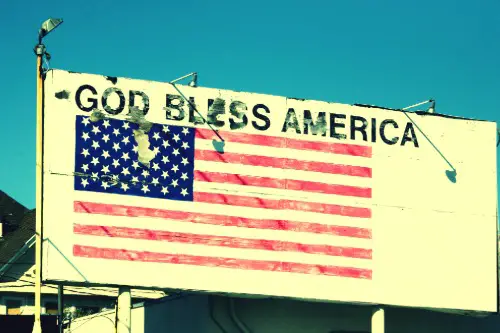
Irving Berlin wrote “God Bless America” in 1918 and revised it in 1938, and it quickly became a beloved national standard. But during World War II, some saw it as overly sentimental or even politically suspect. Woody Guthrie famously disliked its glossy optimism, feeling it ignored America’s real struggles. His frustration even inspired him to write “This Land Is Your Land” as a pointed response.
There were also objections from isolationists in the early 1940s, who thought its renewed popularity could be used to drum up support for entering the war. Others simply found it too polished to reflect the gritty truth of American life. Despite the pushback, the song became deeply embedded in public events. Today, it’s hard to imagine it as anything but universally embraced, though its history tells a different story.
4. This Land Is Your Land – Woody Guthrie
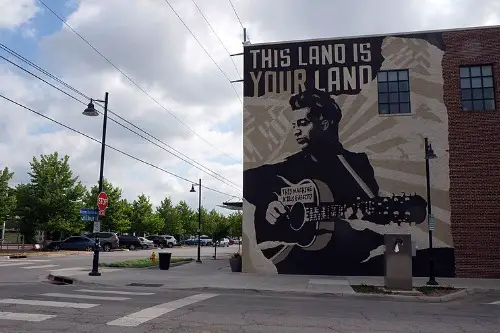
On the surface, “This Land Is Your Land” sounds like an inclusive celebration of America’s beauty. But Guthrie wrote it in 1940 partly as a rebuttal to “God Bless America,” inserting verses that questioned inequality and land ownership. Those original verses—about private property signs and hungry people—were often omitted in schoolbook versions. That editing smoothed over the song’s sharper political edge.
Some critics later accused the song of being socialist propaganda. Guthrie, a man of the working class, saw it more as a plea for fairness and shared opportunity. The version most Americans know is far less provocative than the one Guthrie actually performed. In its full form, it’s a lot more complicated than the cheerful singalong many remember from childhood.
5. My Country, ’Tis of Thee – Marian Anderson’s 1939 Performance
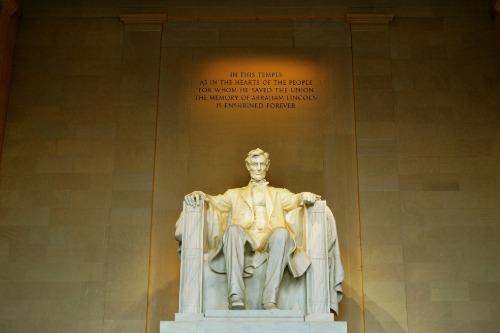
When contralto Marian Anderson sang “My Country, ’Tis of Thee” at the Lincoln Memorial in 1939, it became an iconic moment of civil rights history. She had been barred from performing at Constitution Hall because of her race, prompting First Lady Eleanor Roosevelt to intervene. While the performance was undeniably patriotic, it also spotlighted America’s deep racial hypocrisy. The very lyrics about freedom and liberty stood in stark contrast to Anderson’s lived experience.
Some saw the event as a quiet protest as much as a concert. Anderson herself never framed it as an act of defiance, but the symbolism was impossible to miss. For supporters, it was proof that true patriotism sometimes means confronting uncomfortable truths. In that way, the performance stirred debate while inspiring a generation.
6. Yankee Doodle
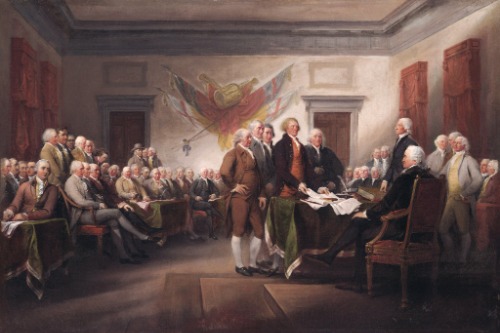
“Yankee Doodle” might seem like harmless Revolutionary War-era fun, but it began as a British song mocking American colonists. British soldiers used it to insult the scruffy, disorganized militias, with “macaroni” being slang for an overdressed fop. Americans later embraced it ironically, turning it into a proud anthem of defiance. Still, its origins were rooted in ridicule, not respect.
This twisty history means the song’s patriotism is born from an act of reclamation. Some historians point out that even after its adoption, parts of the original lyrics were still sung to mock Americans. By the time it became a children’s staple, its satirical bite had been forgotten. But its beginnings as an insult give it an unusual place in patriotic music.
7. America – West Side Story

Leonard Bernstein and Stephen Sondheim’s “America” from West Side Story is one of Broadway’s most famous showpieces. It’s catchy, celebratory, and often read as an immigrant’s love letter to the U.S. But the lyrics are actually a sharp back-and-forth between optimism and frustration, particularly about Puerto Rican life in America. The cheerful melody masks a critique of racism, poverty, and broken promises.
When the film version was released in 1961, some audiences bristled at its blunt commentary on inequality. Others loved its honesty, saying it reflected the dual reality of the immigrant experience. In a sense, it’s both a patriotic song and a protest song at the same time. That tension has helped it remain relevant decades later.
8. Ballad of the Green Berets – Staff Sgt. Barry Sadler
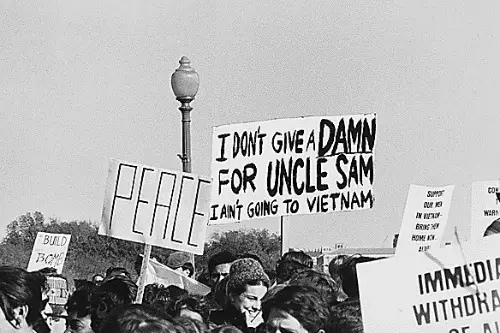
Released in 1966, “Ballad of the Green Berets” was a massive hit, celebrating the bravery of U.S. Special Forces. At the height of the Vietnam War, it stood out as one of the few popular songs that was openly pro-military. Supporters embraced it as a proud tribute to American soldiers, but anti-war activists saw it as propaganda. That division made it a lightning rod in an already polarized time.
Its popularity underscored just how split the country was over the war. To some, the song honored sacrifice; to others, it whitewashed a controversial conflict. Sadler himself was both celebrated and criticized for taking such a clear stance. Today, it’s remembered as a rare moment when a patriotic ballad topped the charts during a deeply divisive war.
9. American Woman – The Guess Who
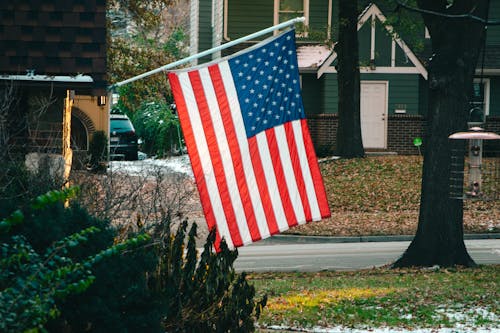
When Canadian band The Guess Who released “American Woman” in 1970, U.S. listeners couldn’t decide if it was a compliment or an insult. The song’s lyrics seemed to reject American women as symbols of consumerism and the draft-era establishment. Some interpreted it as anti-American altogether, despite the band’s claims it was more about avoiding the Vietnam draft. That didn’t stop it from becoming a hit—and a source of misunderstanding.
Lead singer Burton Cummings later clarified it wasn’t meant to insult individual women, but to express discomfort with U.S. politics and culture at the time. The ambiguity left plenty of room for controversy. Even so, its driving riff and swagger kept it in heavy rotation on rock radio. It remains a prime example of how national identity and music can collide.
10. Courtesy of the Red, White and Blue – Toby Keith
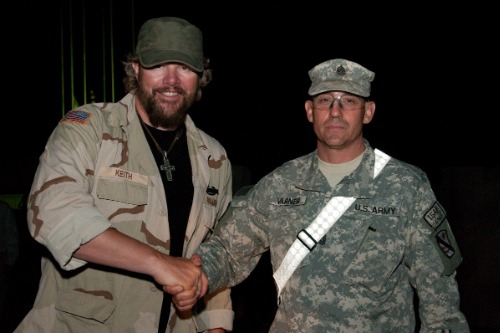
Toby Keith wrote “Courtesy of the Red, White and Blue (The Angry American)” in 2002 after the September 11 attacks. The song’s blunt, retaliatory tone—especially the line about putting a “boot in your ass”—was a hit with some listeners and deeply off-putting to others. Critics accused it of promoting blind nationalism and glorifying violence. Supporters saw it as a cathartic release of grief and rage.
The controversy peaked when the Dixie Chicks criticized the song, leading to a public feud. Keith defended it as an expression of raw patriotism, not a policy statement. The divide over the song reflected the broader cultural split in post-9/11 America. To this day, it’s cited as one of the most polarizing patriotic hits in country music.
11. The Battle Hymn of the Republic
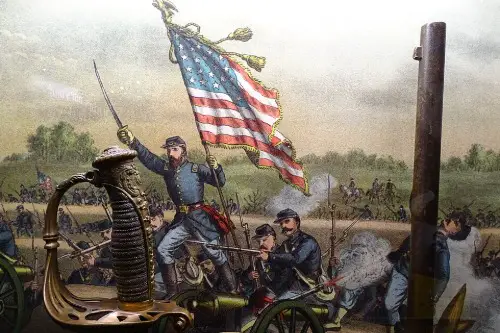
Written in 1861, “The Battle Hymn of the Republic” became a Union anthem during the Civil War. While many see it as a stirring call for justice, Confederate sympathizers despised it. Its abolitionist undertones and biblical imagery made it a deeply political song, not just a religious or patriotic one. Julia Ward Howe’s lyrics left no doubt about which side it supported.
Over the years, it’s been repurposed for various causes, from civil rights marches to political campaigns. Each use has sparked its own round of debate about its meaning and ownership. Its association with moral righteousness can be inspiring or alienating, depending on one’s perspective. That layered history makes it far more complex than a simple patriotic hymn.
12. American Pie – Don McLean
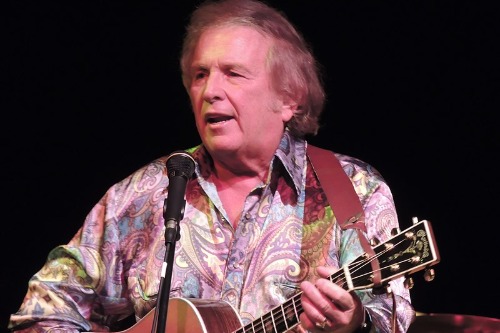
Don McLean’s 1971 epic “American Pie” isn’t overtly patriotic, but its nostalgic tone has made it feel like a national portrait. The lyrics trace the loss of innocence in American culture, starting with the plane crash that killed Buddy Holly. Some embraced it as a heartfelt tribute to American music and values. Others saw it as a mournful critique of the country’s moral decline.
McLean has famously kept the song’s meanings ambiguous, which has only fueled speculation. That vagueness allows listeners to project their own politics onto it—sometimes in ways that clash. In that way, it’s been celebrated and questioned in equal measure. The fact that it can spark debate after all these years is part of its lasting appeal.
This post 12 Patriotic Songs That Were Accidentally Controversial was first published on American Charm.


